Unit 6 I'm going to study computer science. Section A(3a-3c)课件 (共21张PPT)
文档属性
| 名称 | Unit 6 I'm going to study computer science. Section A(3a-3c)课件 (共21张PPT) | 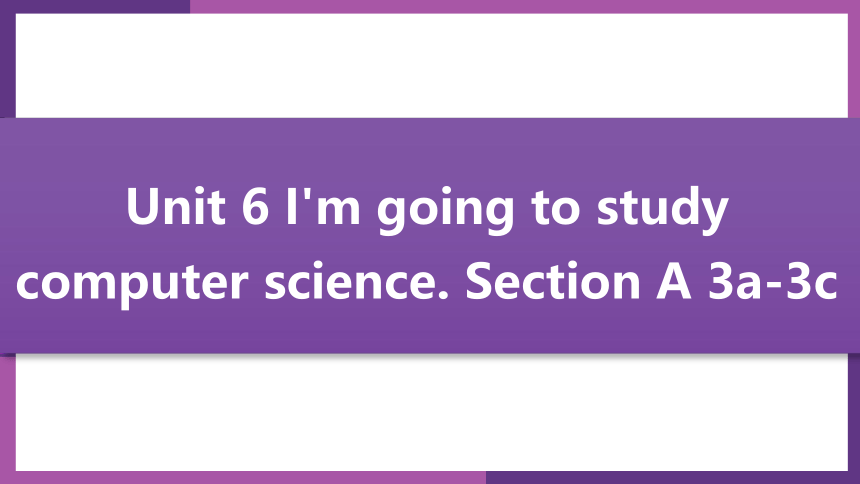 | |
| 格式 | zip | ||
| 文件大小 | 837.0KB | ||
| 资源类型 | 教案 | ||
| 版本资源 | 人教新目标(Go for it)版 | ||
| 科目 | 英语 | ||
| 更新时间 | 2022-06-14 22:32:20 | ||
图片预览

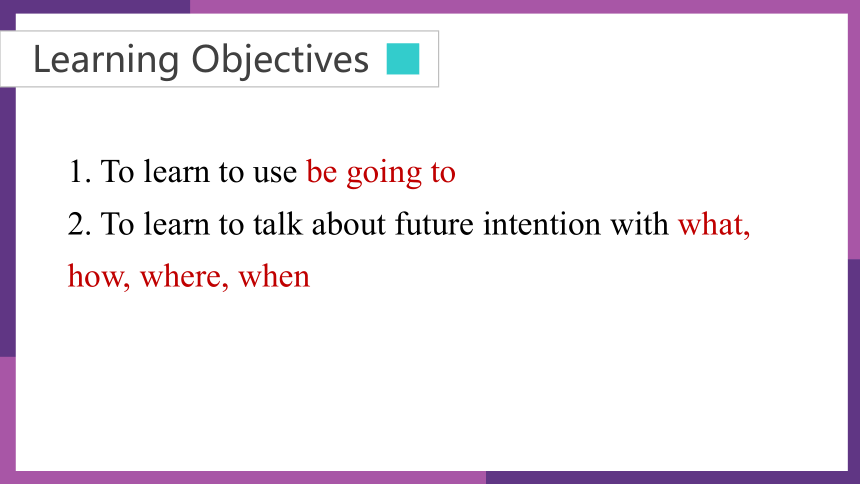
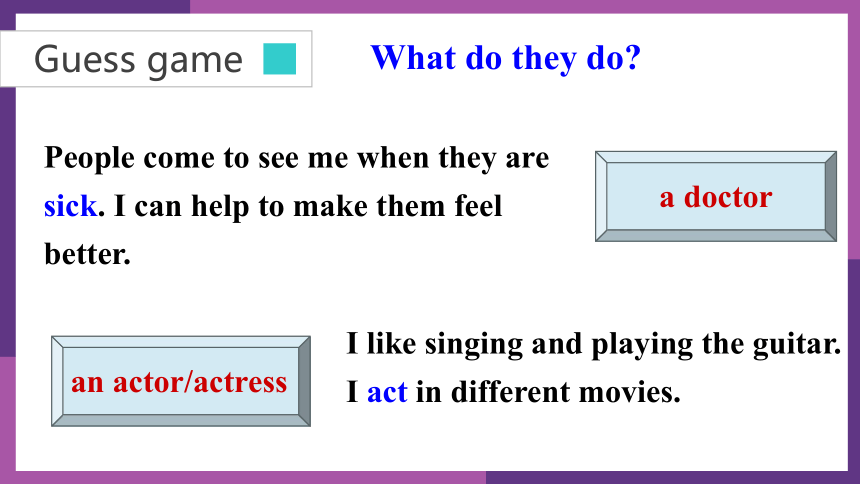
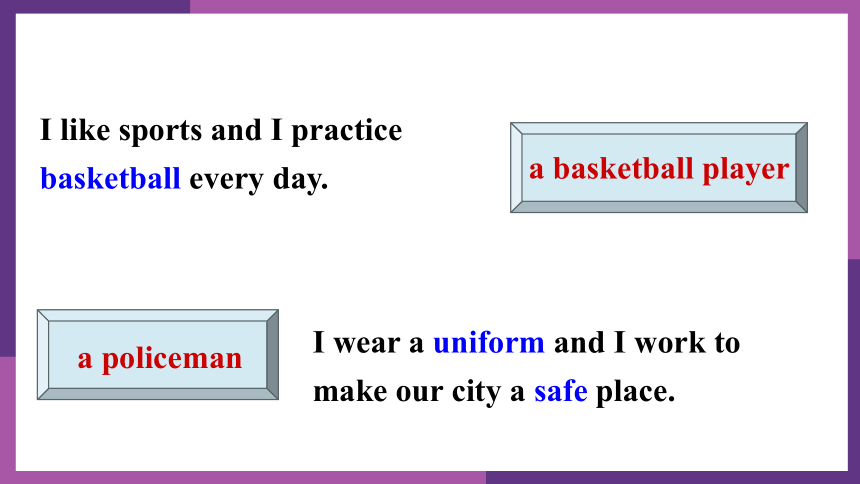
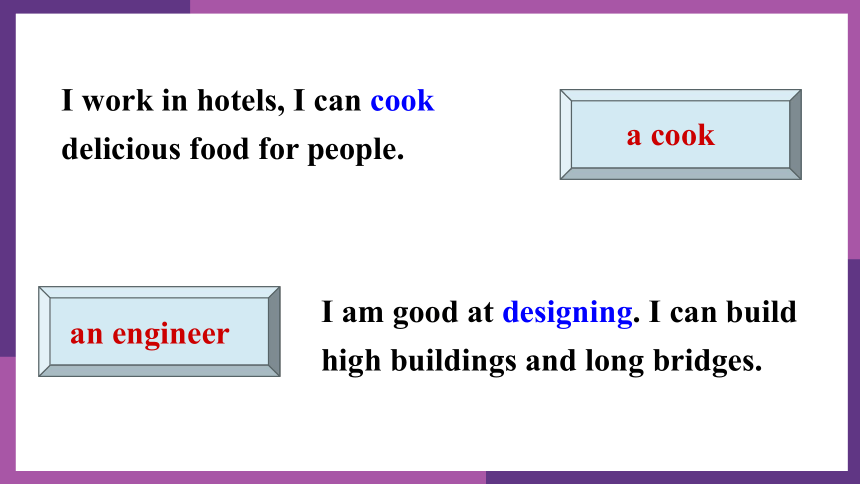
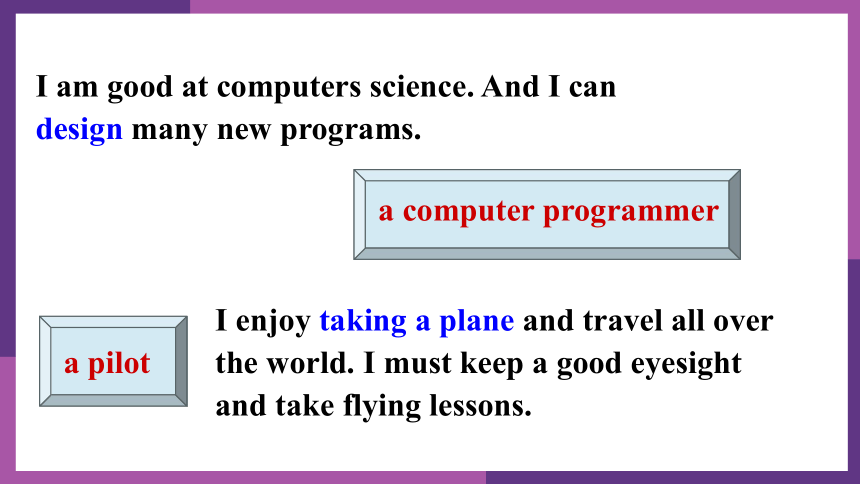
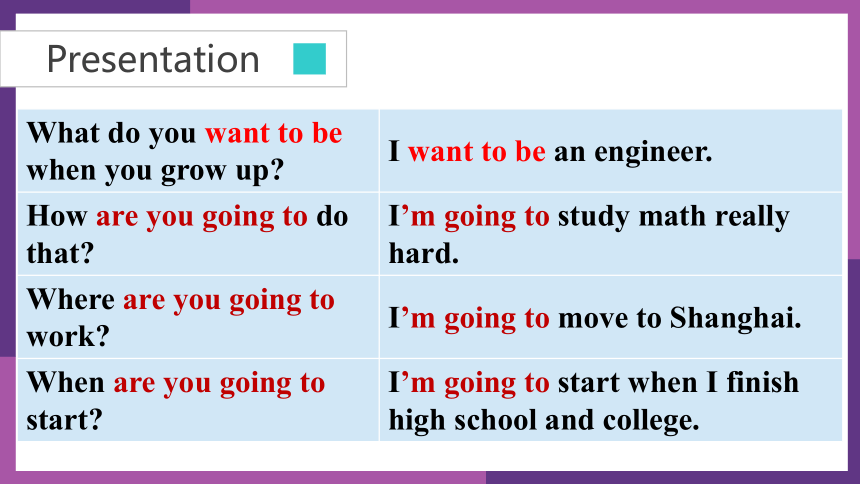
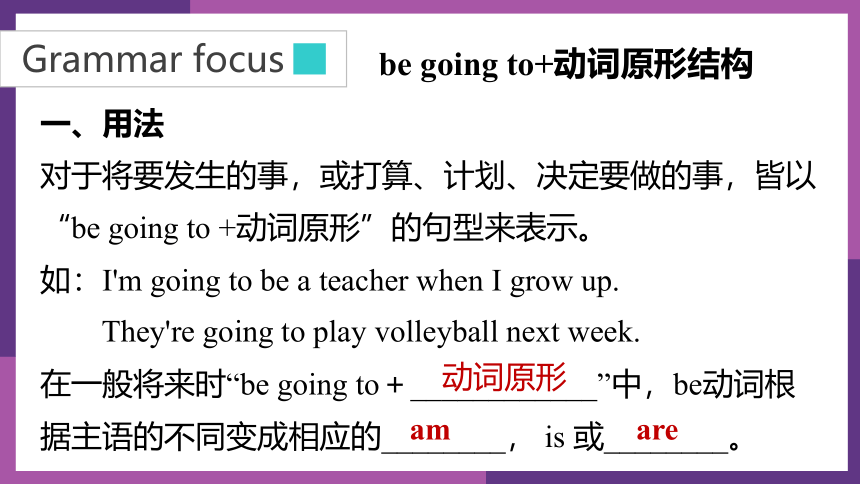
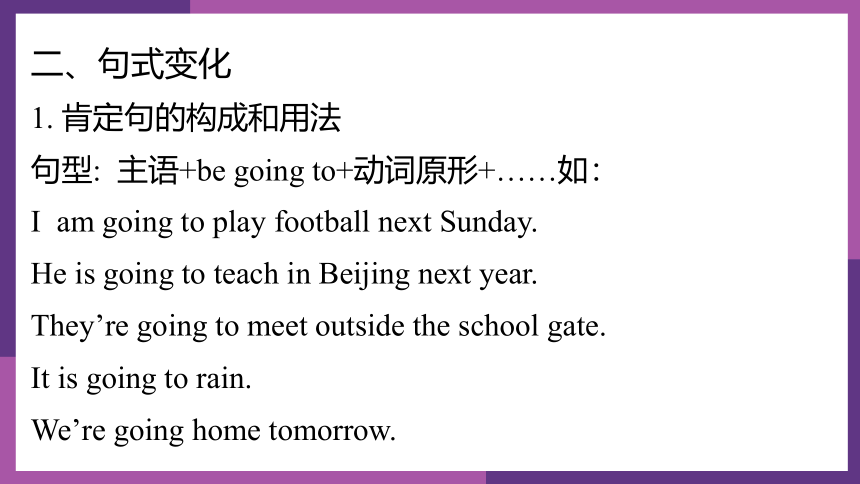
文档简介
(共21张PPT)
Unit 6 I'm going to study computer science. Section A 3a-3c
1. To learn to use be going to
2. To learn to talk about future intention with what, how, where, when
Learning Objectives
I like singing and playing the guitar.
I act in different movies.
People come to see me when they are sick. I can help to make them feel better.
What do they do
a doctor
an actor/actress
Guess game
I wear a uniform and I work to make our city a safe place.
a basketball player
I like sports and I practice basketball every day.
a policeman
I work in hotels, I can cook delicious food for people.
a cook
an engineer
I am good at designing. I can build high buildings and long bridges.
a computer programmer
I am good at computers science. And I can design many new programs.
a pilot
I enjoy taking a plane and travel all over the world. I must keep a good eyesight and take flying lessons.
Presentation
What do you want to be when you grow up I want to be an engineer.
How are you going to do that I’m going to study math really hard.
Where are you going to work I’m going to move to Shanghai.
When are you going to start I’m going to start when I finish high school and college.
be going to+动词原形结构
Grammar focus
一、用法
对于将要发生的事,或打算、计划、决定要做的事,皆以“be going to +动词原形”的句型来表示。
如:I'm going to be a teacher when I grow up.
They're going to play volleyball next week.
在一般将来时“be going to+____________”中,be动词根据主语的不同变成相应的________, is 或________。
动词原形
am
are
二、句式变化
1. 肯定句的构成和用法
句型: 主语+be going to+动词原形+……如:
I am going to play football next Sunday.
He is going to teach in Beijing next year.
They’re going to meet outside the school gate.
It is going to rain.
We’re going home tomorrow.
2. 否定句的构成和用法
句型:主语+be not going to +动词原形如:
We’re not going to have any class next week.
It’s not going to rain this afternoon.
I’m not going to be a teacher.
He isn’t going to see his brother tomorrow.
They aren’t going to watch TV this evening.
3. 一般疑问句的构成和用法
句型: be+主语+going to +动词原形…?如:
Are you going to be a doctor in the future
Yes, I am.(肯定回答)
No, I’m not.(否定回答)。
Is your sister going to bring you lunch
Yes, she is.
No, she isn’t.
4. 特殊疑问句的构成和用法
句型: 特殊疑问词+一般疑问句
How are they going to school tomorrow -By bike.
What is he going to do next Sunday -He is going to read books.
When are you going to buy a new bike -Tomorrow.
Where is the little girl going -She is going to her grandma’s home.
拓展:
当there be句型与be going to连用时,意为“将有……”,它的结构是“There is/are going to be…”。注意to后的be动词不能换成have。
下周六将会有一场足球赛。
误:There is going to have a football match next Saturday.
正:There is going to be a football match next Saturday.
Match what these people want to do with what they are going to do.
3a
They’re going to practice every day.
I’m going to buy a fast car
We’re going to take singing lessons.
She’s going to study education.
She’s going to study math.
I’m going to study science.
He’s going to a cooking school.
He’s going to take acting lessons.
____1. My friend wants to be an engineer.
____2. My brother wants to be an actor.
____3. I want to be a scientist.
____4. My sister wants to be a school teacher.
____5. Those boys want to be soccer players.
____6. My friend and I want to be singers.
____7. My cousin wants to be a cook.
____8. I want to be a race car driver.
e
h
f
d
a
c
g
b
3b
Fill in the blanks. Then practice the conversation.
A: Kelly, what do you want to be _____ you grow up
B: I _____ to be a doctor.
A: Wow! _____ are you going to do that
B: I’m ______ to study medicine at a university.
A: Hmm…sounds difficult. ______ are you ______ to
study
B: I’m going to______ in London.
A: _______ are you going to start
B: I’m going to ______ next September.
when
want
How
going
Where
going
study
When
start
3c
Complete the chart and discuss it with your partner.
A: What do you want to be when you grow up
B: I want to be a reporter.
A: How are you going to do that
B: I’m going to write articles and send them to
magazines and newspapers.
What
Where
How
When
[观察1] I'm going to write articles and send them to magazines and newspapers.
我打算写文章,并把它们寄给杂志社和报社。
Please send me a book.=Please send a book to me.
请给我寄一本书。
[探究] send意为“邮寄;发送”。其过去式是 ________。send sb. sth.=send sth. to sb.,意为“________________”。
sent
把某物寄给某人
[拓展] send作动词时,还有“派遣;打发”之意。send sb. to do sth.意为“派遣某人做某事”。
She sent me to pick up her son last week.
她上周派我去接她儿子。
Summary
Unit 6 I'm going to study computer science. Section A 3a-3c
1. To learn to use be going to
2. To learn to talk about future intention with what, how, where, when
Learning Objectives
I like singing and playing the guitar.
I act in different movies.
People come to see me when they are sick. I can help to make them feel better.
What do they do
a doctor
an actor/actress
Guess game
I wear a uniform and I work to make our city a safe place.
a basketball player
I like sports and I practice basketball every day.
a policeman
I work in hotels, I can cook delicious food for people.
a cook
an engineer
I am good at designing. I can build high buildings and long bridges.
a computer programmer
I am good at computers science. And I can design many new programs.
a pilot
I enjoy taking a plane and travel all over the world. I must keep a good eyesight and take flying lessons.
Presentation
What do you want to be when you grow up I want to be an engineer.
How are you going to do that I’m going to study math really hard.
Where are you going to work I’m going to move to Shanghai.
When are you going to start I’m going to start when I finish high school and college.
be going to+动词原形结构
Grammar focus
一、用法
对于将要发生的事,或打算、计划、决定要做的事,皆以“be going to +动词原形”的句型来表示。
如:I'm going to be a teacher when I grow up.
They're going to play volleyball next week.
在一般将来时“be going to+____________”中,be动词根据主语的不同变成相应的________, is 或________。
动词原形
am
are
二、句式变化
1. 肯定句的构成和用法
句型: 主语+be going to+动词原形+……如:
I am going to play football next Sunday.
He is going to teach in Beijing next year.
They’re going to meet outside the school gate.
It is going to rain.
We’re going home tomorrow.
2. 否定句的构成和用法
句型:主语+be not going to +动词原形如:
We’re not going to have any class next week.
It’s not going to rain this afternoon.
I’m not going to be a teacher.
He isn’t going to see his brother tomorrow.
They aren’t going to watch TV this evening.
3. 一般疑问句的构成和用法
句型: be+主语+going to +动词原形…?如:
Are you going to be a doctor in the future
Yes, I am.(肯定回答)
No, I’m not.(否定回答)。
Is your sister going to bring you lunch
Yes, she is.
No, she isn’t.
4. 特殊疑问句的构成和用法
句型: 特殊疑问词+一般疑问句
How are they going to school tomorrow -By bike.
What is he going to do next Sunday -He is going to read books.
When are you going to buy a new bike -Tomorrow.
Where is the little girl going -She is going to her grandma’s home.
拓展:
当there be句型与be going to连用时,意为“将有……”,它的结构是“There is/are going to be…”。注意to后的be动词不能换成have。
下周六将会有一场足球赛。
误:There is going to have a football match next Saturday.
正:There is going to be a football match next Saturday.
Match what these people want to do with what they are going to do.
3a
They’re going to practice every day.
I’m going to buy a fast car
We’re going to take singing lessons.
She’s going to study education.
She’s going to study math.
I’m going to study science.
He’s going to a cooking school.
He’s going to take acting lessons.
____1. My friend wants to be an engineer.
____2. My brother wants to be an actor.
____3. I want to be a scientist.
____4. My sister wants to be a school teacher.
____5. Those boys want to be soccer players.
____6. My friend and I want to be singers.
____7. My cousin wants to be a cook.
____8. I want to be a race car driver.
e
h
f
d
a
c
g
b
3b
Fill in the blanks. Then practice the conversation.
A: Kelly, what do you want to be _____ you grow up
B: I _____ to be a doctor.
A: Wow! _____ are you going to do that
B: I’m ______ to study medicine at a university.
A: Hmm…sounds difficult. ______ are you ______ to
study
B: I’m going to______ in London.
A: _______ are you going to start
B: I’m going to ______ next September.
when
want
How
going
Where
going
study
When
start
3c
Complete the chart and discuss it with your partner.
A: What do you want to be when you grow up
B: I want to be a reporter.
A: How are you going to do that
B: I’m going to write articles and send them to
magazines and newspapers.
What
Where
How
When
[观察1] I'm going to write articles and send them to magazines and newspapers.
我打算写文章,并把它们寄给杂志社和报社。
Please send me a book.=Please send a book to me.
请给我寄一本书。
[探究] send意为“邮寄;发送”。其过去式是 ________。send sb. sth.=send sth. to sb.,意为“________________”。
sent
把某物寄给某人
[拓展] send作动词时,还有“派遣;打发”之意。send sb. to do sth.意为“派遣某人做某事”。
She sent me to pick up her son last week.
她上周派我去接她儿子。
Summary
同课章节目录
- Unit 1 Where did you go on vacation?
- Section A
- Section B
- Unit 2 How often do you exercise?
- Section A
- Section B
- Unit 3 I'm more outgoing than my sister.
- Section A
- Section B
- Unit 4 What's the best movie theater?
- Section A
- Section B
- Unit 5 Do you want to watch a game show?
- Section A
- Section B
- Unit 6 I'm going to study computer science.
- Section A
- Section B
- Unit 7 Will people have robots?
- Section A
- Section B
- Unit 8 How do you make a banana milk shake?
- Section A
- Section B
- Unit 9 Can you come to my party?
- Section A
- Section B
- Unit 10 If you go to the party, you'll have a grea
- Section A
- Section B
